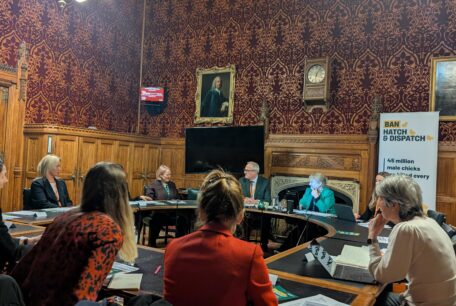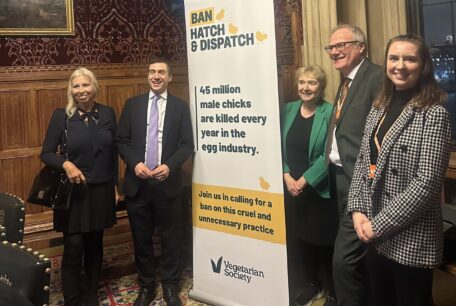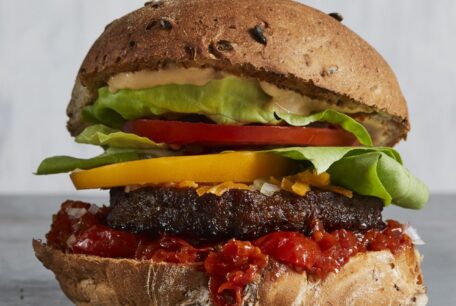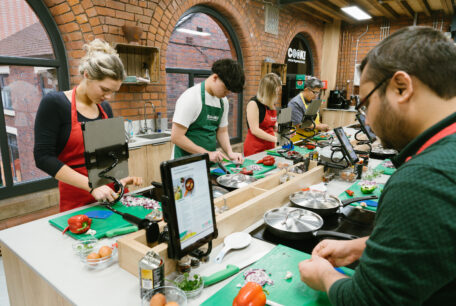
Lib Dem Party Conference Sept 2025
Jenny Canham, Public Affairs Lead
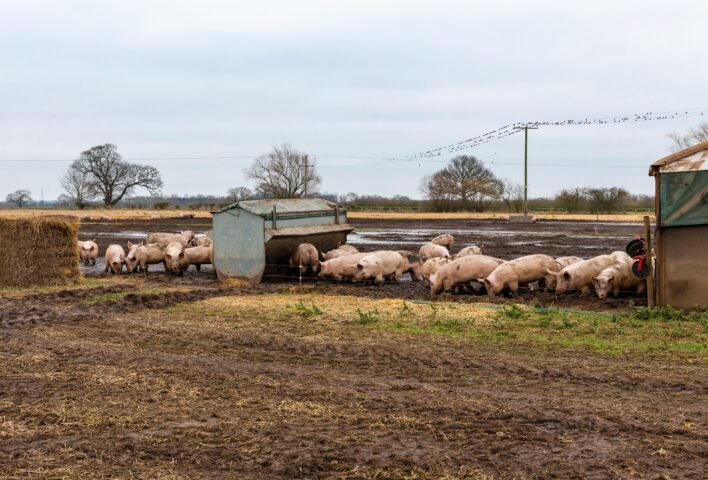
What We Learned About Animals, Food and the Environment at the Lib Dem Party Conference
Earlier this week, I attended the Liberal Democrat Party Conference to listen in on debates about food, farming, and the environment. It was a packed few days, and one thing was clear: the environment is firmly on the political agenda for the Lib Dem party, in fact, this is something the party prides itself on. But where do issues such as animal welfare and food strategy fit in with the party’s priorities? Keep reading to find out more.
Farmers, food, and animal welfare
At a Q&A session, Tim Farron MP, Lib Dem spokesperson for Environment, Food and Rural Affairs, painted a stark picture of the challenges facing British farmers. He explained that many farmers are diversifying their businesses because they simply can’t make a living from farming alone. For upland farmers, he said, the average income is barely above minimum wage.
In July, the government released its long-awaited ‘Food Cycle’ Plan. In the Lib Dem party’s efforts towards a more sustainable food system, Farron promised that animal welfare would remain a top priority, along with food security and reducing food waste. He proudly pointed back to the party’s record in government, where they helped end the use of battery cages for hens, and said he wanted to see strong standards upheld in any future trade deals.
His words struck a chord with me: “Poor standards are cheaper than good standards. But they come at the expense of animal suffering – and that should never be the basis for trade.” Protection of animal welfare in trade is something that we, at the Vegetarian Society, very much support. It’s critical that we protect our animal welfare standards in any trade deals with other countries, whilst also working to uphold our reputation as a leader in animal welfare, through ending cruel and outdated practices such as male chick culling in the UK.
Climate and nature — the bigger picture
A whole day of the conference was devoted to the environment, which shows what a priority this is for the party. Research shows that Lib Dem voters are twice as likely as the general public to rank the environment among their top issues, making it a real motivator at the ballot box.
One particular panel, which included MPs and experts from WWF, made it clear that food and farming must be part of the climate conversation.
Farmers manage 70% of the UK’s land, and without their involvement we simply can’t make the progress needed on nature or climate. Speakers talked about the potential of nature-friendly farming, including practices like planting legumes to boost soil health.
But they also warned that farmers can’t be left to carry the costs alone. Unless the government provides proper support and incentives, many farmers risk falling back on intensive systems just to survive. That would undo years of progress on both climate and animal welfare. It’s clear we need to support farmers to make the changes we so desperately need to farm in a more sustainable way.
Methane, meat, and missed chances
Baroness Sheehan, Lib Dem member of the House of Lords, raised an urgent issue: the acceleration of climate change due to unprecedent levels of gases such as methane in the atmosphere. Methane is 80 times more powerful than CO₂, and tackling it could reduce global warming by as much as 0.3°C. Agriculture plays a big role here, as animals such as cows are leading producers of methane, and while there has been some progress in the UK, there’s still a long way to go.
This led to the question: what role should the Lib Dems play in supporting a shift away from meat and towards plant-based proteins? On this point, the party still seems hesitant. Baroness Sheehan admitted that promoting a consumer behaviour shift towards eating less meat and more plants hasn’t been a focus. Instead, she emphasised tackling food waste – nearly a quarter of all meat produced in the UK never gets eaten. This is of course an important issue, but I still think the Lib Dem party needs to take more action to encourage a consumer behaviour shift towards plant-rich lifestyles in order to meet its climate change goals.
It was encouraging, though, to hear WWF make the case for “nutrition security” – not just producing enough food, but making sure diets are healthy, balanced, and sustainable. With 70% of the world’s food supply coming from just 12 plants and five animals, there’s a real need to diversify, including greater investment in plant-based options.
The power of advertising
Fringe events ran alongside the conference, and I was pleased to see the efforts of other organisations working towards a healthier and more sustainable planet. One particularly fascinating discussion, led by Ad Free Cities, was about advertising and how it shapes our choices. Research shows that billboards for junk food are often clustered in lower income areas, and that companies flood the UK with millions of ads each year.
Some councils are pushing back. Edinburgh and Sheffield have banned fossil fuel adverts, and Transport for London has cracked down on junk food ads across the network. Restricting ads for junk food, and meat that comes from industrial farming systems in particular, could have a real impact on the country. I’m interested to see how this campaign develops and how we can work to fight misinformation and increase public education on industrial farming practices.
Where do the Lib Dems stand?
So, what does all this mean for animals and the environment?
On the positive side, the Lib Dems clearly care about animal welfare. They are determined to stop trade deals that undermine British standards, they celebrate their record of ending cages for hens, and they’re exploring how food waste and food security fit into the climate conversation.
At the same time, there’s still a reluctance to fully face up to the need for a dietary shift. Until we support a move away from intensive animal farming and towards plant-based proteins, the UK will struggle to meet its climate goals or guarantee long-term food security.
But conferences like this show the conversation is evolving. It was encouraging to hear so many voices – MPs, peers, NGOs, and campaigners – talking about the connections between what we eat, how we farm, and how we protect animals. The Lib Dems have a history of action on animal welfare when in government, and their supporters clearly expect them to stay true to that tradition.
Your voice matters
As always, your support is what makes change possible. We will continue to press politicians of all parties to raise animal welfare standards and support healthier, more sustainable lifestyles.
What do you think? Should the Lib Dems be bolder in encouraging the nation to eat more plants and reduce meat consumption, whilst doing more to champion animal welfare?
If you have a Lib Dem MP, you can let them know that they can help the UK to uphold its reputation as a leader in animal welfare by supporting an end to male chick culling through our Ban Hatch & Dispatch campaign.
